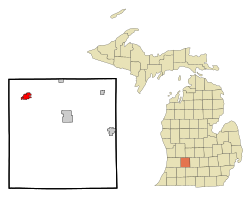2010 census
As of the census [11] of 2010, there were 3,319 people, 1,268 households, and 872 families residing in the village. The population density was 1,455.7 inhabitants per square mile (562.0/km2). There were 1,449 housing units at an average density of 635.5 per square mile (245.4/km2). The racial makeup of the village was 95.3% White, 0.2% African American, 0.7% Native American, 0.7% Asian, 1.1% from other races, and 2.0% from two or more races. Hispanic or Latino of any race were 4.4% of the population.
There were 1,268 households, of which 41.2% had children under the age of 18 living with them, 48.7% were married couples living together, 13.2% had a female householder with no husband present, 6.8% had a male householder with no wife present, and 31.2% were non-families. Of all households 27.1% were made up of individuals, and 13.8% had someone living alone who was 65 years of age or older. The average household size was 2.61 and the average family size was 3.16.
The median age in the village was 32.4 years. 30.5% of residents were under the age of 18; 7.3% were between the ages of 18 and 24; 28.2% were from 25 to 44; 21.8% were from 45 to 64; and 12.2% were 65 years of age or older. The gender makeup of the village was 48.5% male and 51.5% female.
2000 census
As of the census [2] of 2000, there were 2,721 people, 998 households, and 711 families residing in the village. The population density was 1,313.7 inhabitants per square mile (507.2/km2). There were 1,050 housing units at an average density of 506.9 per square mile (195.7/km2). The racial makeup of the village was 95.74% White, 0.18% African American, 0.44% Native American, 0.74% Asian, 1.18% from other races, and 1.73% from two or more races. Hispanic or Latino of any race were 2.17% of the population.
There were 998 households, out of which 42.4% had children under the age of 18 living with them, 52.6% were married couples living together, 12.7% had a female householder with no husband present, and 28.7% were non-families. Of all households 24.5% were made up of individuals, and 10.0% had someone living alone who was 65 years of age or older. The average household size was 2.72 and the average family size was 3.28.
In the village, the population was spread out, with 32.2% under the age of 18, 10.5% from 18 to 24, 32.3% from 25 to 44, 16.5% from 45 to 64, and 8.5% who were 65 years of age or older. The median age was 30 years. For every 100 females, there were 95.6 males. For every 100 females age 18 and over, there were 93.7 males.
The median income for a household in the village was $41,947, and the median income for a family was $46,357. Males had a median income of $34,750 versus $21,883 for females. The per capita income for the village was $17,005. About 3.4% of families and 4.5% of the population were below the poverty line, including 4.3% of those under age 18 and 7.9% of those age 65 or over.

